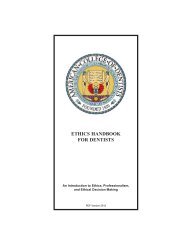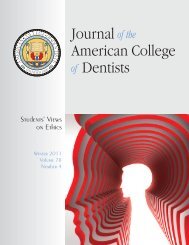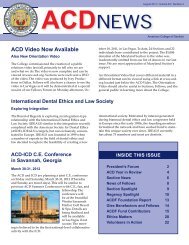JACD 71-4 - American College of Dentists
JACD 71-4 - American College of Dentists
JACD 71-4 - American College of Dentists
- No tags were found...
Create successful ePaper yourself
Turn your PDF publications into a flip-book with our unique Google optimized e-Paper software.
Leadership<br />
58<br />
The boundaries are distinct and ritualized.<br />
A physician and a lawyer may be best <strong>of</strong><br />
friends in social contexts, but their roles<br />
change dramatically—who can initiate<br />
which conversations, whose opinion is<br />
most respected, and what one wears—<br />
depending on whether a lawsuit or a<br />
serious illness is at stake. Goode also<br />
notes that language changes in the<br />
pr<strong>of</strong>essional context. Each pr<strong>of</strong>ession<br />
develops its own way <strong>of</strong> talking that is<br />
designed, to a certain extent, for clear<br />
communication within the pr<strong>of</strong>ession,<br />
but to a very large extent, to signal who<br />
belongs to the pr<strong>of</strong>ession and to prevent<br />
those who are not in the pr<strong>of</strong>ession from<br />
understanding what is being discussed.<br />
The technical term for language that<br />
signals group membership is argot. The<br />
true masters <strong>of</strong> argot in <strong>American</strong> culture<br />
are our teenagers. They constantly<br />
reinvent language that even they may<br />
not understand in order to serve as<br />
social markers and to keep authority<br />
figures at a safe distance.<br />
The last two <strong>of</strong> Goode’s characteristics<br />
<strong>of</strong> a pr<strong>of</strong>ession are related. These are<br />
control over current members <strong>of</strong> the pr<strong>of</strong>ession<br />
and control over potential future<br />
members. For thousands <strong>of</strong> years, both<br />
the church and the military have sought<br />
to maintain a judicial system distinct<br />
from the civil process. These tensions<br />
are still headline news today. Every<br />
pr<strong>of</strong>ession, through proactive codes <strong>of</strong><br />
ethic to peer review panels and internal<br />
sanctions, covets first right <strong>of</strong> refusal to<br />
discipline its own members. The irony<br />
that the law is among the most revered<br />
pr<strong>of</strong>essions and at the same time has<br />
such an objectionable odor comes from<br />
the fact that among all pr<strong>of</strong>essions it is<br />
the only one that can be used to pierce<br />
the veil <strong>of</strong> self discipline enjoyed by its<br />
sister pr<strong>of</strong>essions.<br />
Pr<strong>of</strong>essions also control who can<br />
practice and how, with the highest pr<strong>of</strong>essions<br />
exercising the greatest control.<br />
Lawyers determine who can join the<br />
prestigious firms that have access to the<br />
prestigious clients and who can argue<br />
cases under various jurisdictions such as<br />
the U. S. Supreme Court. Hospitals determine<br />
who has privileges. To a significant<br />
extent, the high pr<strong>of</strong>essions determine<br />
who is eligible to enter the pr<strong>of</strong>ession in<br />
the first place. For example, dental<br />
schools admit only about half <strong>of</strong> the<br />
individuals interested in the pr<strong>of</strong>ession<br />
to study. Another 5% are selected out <strong>of</strong><br />
the pr<strong>of</strong>ession during the educational<br />
process. State boards <strong>of</strong> examiners deny<br />
licenses to approximately 2% <strong>of</strong> applicants<br />
at initial licensure and perhaps<br />
another half <strong>of</strong> 1% <strong>of</strong> dentists lose their<br />
practice privileges.<br />
Pr<strong>of</strong>essions are also concerned with<br />
markets, specialized knowledge, and<br />
public service. An essential task for pr<strong>of</strong>essions<br />
is creating a protected market.<br />
Pr<strong>of</strong>essions seek monopolies, almost<br />
always through political means rather<br />
than through relations with customers.<br />
Clever groups go further than protecting<br />
their markets; they seek to enlarge their<br />
markets by encouraging legislation to<br />
require extended services. For example,<br />
morticians in many states have succeeded<br />
in passing laws that require that the<br />
remains <strong>of</strong> ones dearly departed be<br />
buried whether they are cremated or<br />
not. Engineers vigorously lobby for<br />
increasingly restrictive regulations that<br />
happen to require the use <strong>of</strong> an engineer.<br />
Market formation among the<br />
pr<strong>of</strong>essions also extends to the elimination<br />
<strong>of</strong> counterveiling forces among clients.<br />
Paul Star, in his Pulitzer Prize-winning<br />
study <strong>of</strong> the medical pr<strong>of</strong>ession, describes<br />
the brutal ostracizing <strong>of</strong> those physicians<br />
during the first half <strong>of</strong> the twentieth<br />
century who were salaried employees <strong>of</strong><br />
companies or groups <strong>of</strong> employees.<br />
Today, in the province <strong>of</strong> British Columbia,<br />
Canada, veterinarians are in court,<br />
seeking to restrict the licenses <strong>of</strong> their<br />
colleagues who perform services under<br />
the fee schedule established by the<br />
pr<strong>of</strong>ession. Lawyers and real estate<br />
agents in some states collect a fee for<br />
having their secretaries complete simple<br />
forms that customers could as easily<br />
complete except for legal prohibitions.<br />
Formation <strong>of</strong> a monopolistic market<br />
may be a characteristic <strong>of</strong> many pr<strong>of</strong>essions,<br />
but it is not a defining quality.<br />
Many labor groups, especially unions,<br />
are more vigorous in limiting markets<br />
than are pr<strong>of</strong>essionals. Garbage collectors<br />
in New York City and the Mafia would<br />
certainly have something to show the<br />
<strong>American</strong> Dental Association about<br />
market formation. On the other hand,<br />
the oldest pr<strong>of</strong>ession in the world<br />
certainly has entry and exit barriers.<br />
More than market protection is involved<br />
in pr<strong>of</strong>essions.<br />
Some have said that pr<strong>of</strong>essions are<br />
built around licenses—state-recognized<br />
authority to perform certain actions,<br />
typically connected with an examination.<br />
The argument that licensure is a<br />
foundation for pr<strong>of</strong>essionalism crumbles<br />
quickly. Real estate licenses are plentiful;<br />
almost anyone who drives a car has a<br />
license to do so. Years ago, I wanted a<br />
bedroom and bathroom added to my<br />
house in San Francisco and arranged for<br />
a very talented handyman whom I knew<br />
to perform the work. The problem was,<br />
he did not have a contractor’s license<br />
and I wanted the work done to code.<br />
The solution was for me to purchase a<br />
book on electrical codes and a book on<br />
plumbing codes and to study them. After<br />
an hour with each, I passed the county<br />
contractor’s license and sub-contracted<br />
the work to my friend. I had the license<br />
but he was the pr<strong>of</strong>essional.<br />
Some critics <strong>of</strong> the pr<strong>of</strong>essions<br />
recognize the important role played by<br />
licensure, educational qualification,<br />
certification, bonding, regulation, and<br />
liability to law suits as necessary demonstrations<br />
<strong>of</strong> pr<strong>of</strong>essional competence and<br />
countervailing power for consumers.<br />
But, as Lieberman notes, “because regu-<br />
2005 Volume <strong>71</strong>, Number 4





